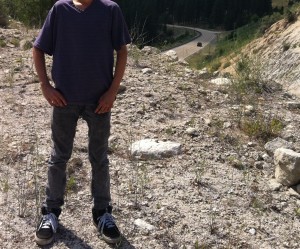Last Wednesday I flew out for the Parent Workshop at Luca’s boarding school. We drove three hours through dusty canyons, past mountain ridges lined with evergreens, into a National Forest for a camping trip with the other families.
Over the course of three days, we listened to lectures, participated in experiential exercises with our kids, and checked in with other parents:
“What level is Cody on?”
“When do you think Dakota’s going home?”
“How was Ben’s last home visit?”
“What meds is Henry taking?”
The first day, it was 105 degrees. The second day, we all shivered in the damp drizzle. I huddled by the campfire next to one of my favorite moms, Julia, from Seattle. Her son Dylan is expected to reach the top level soon. She was unabashedly ambivalent about his transition home: would he come after her with knives again? How would he handle public school? How would she cope with his “ornery personality?”
The workshops are the antithesis of Mompetition culture. You can talk about how terrified you are to bring your kid home, or how terrified you are that you’ll never be able to bring your kid home, or how low your kid’s test scores are — how low your kid’s test scores are! — and know you won’t be judged.
The morning before we drove out to the camp site, we sat in a Parenting lecture in the school’s family meeting room. Midway through the seminar, we heard banging, the sounds of objects colliding with walls, screams to “get your effing hands off me!” Then the boy was escorted outside by Staff, his shouts fading into the mountain air.
No one batted an eye.
* * *
The winding drive to the camp site was mostly silent, and awkward. Three hours in a car with a 15-year-old boy who’s pissed that he’s been sent to a place where he almost never gets to see girls, or go on Facebook, is a long time. Mix in some bitter feelings because his parents ruined his childhood with their lousy divorce, and three hours can feel like Chinese water torture.
I handed Luca the carton of “conversation starters” the Staff had given us in anticipation of no conversations. This is the type of request that, pre-boarding school, would have incited a wave of protests.
But there wasn’t one. Luca opened the carton and pulled out a fortune cookie type piece of paper. He read, in an I-don’t-want-to-do-this-but-my-therapist-is-going-to-ask-you-how-things-are-doing monotone:
“What one thing do you want to be remembered for?”
I wondered if the divorce had obscured any good memories Luca might have of me. My mind felt like a vast blank canvas. I reached into the future and came up with this:
“I want to be remembered for being a devoted grandmother…if you guys have kids…I want to be really involved with them.”
Luca didn’t respond: whatever. He pulled another conversation starter from the carton.
“What was your favorite family vacation?”
Knife in the heart.
“Well…that’s tough. We didn’t get to have a lot of them…”
Between my single mother budget and Luca’s meltdowns when we changed locales, we rarely went anywhere. Prince had enough bells and whistles — multiple vacation homes, 24/7 staff, and a large extended family — to satisfy Luca, who has taken almost all his vacations with his father.
“…oh! When we went to Pismo Beach! Remember how you loved it there, riding ATVs in the sand dunes?”
“Uh-huh,” he said.
I glanced over at my son, so beautiful with his thick dark lashes and golden-brown Bieber cut. I winced at the sight of his toothpick-thin arms, the skin around his bony elbow white and stretched thin.
He has, since wilderness camp, gone on a partial food strike, and has lost so much weight that he’s seeing a nutritionist.
Since he eats more when he can escape school food, I ply him with milk shakes and burgers and mozzarella sticks when I see him.
He stared out the windshield, a half-eaten Subway sandwich in his lap. I turned my eyes back to the dusty road.
My mind got stuck in its well-trod rut, repeating the hellish mantra that the god of Divorce Guilt has bestowed upon me:
Would Luca have been better off if I’d stayed with Prince?
* * *
The writers Somerset Maugham and John O’Hara both were inspired by a fable about an Indian Servant trying to dodge Death after spotting her in the marketplace. His Master lends him a horse so the Servant can hide miles away in Samarra. The Master finds Death in the marketplace and asks her why she threatened his Servant. Death replies that she was merely surprised to see the Servant in the marketplace because she has an appointment with him that night in Samarra.
The meaning: all roads lead to the same place. Wherever you go, there you are. Until you grow up.
I thought about Appointment in Samarra often during the workshop. If I’d had more self-esteem, and more self-agency when I met Prince, I never would have signed on for the one-way relationship I had. But I was a lost, codependent child then, and there was no way I could have changed and stayed married.
If I’d stayed married, I would have stayed screwed up. I might have frolicked with the pool man and run amok with Botox and Restalyne. Prince and his family still would have shoved me to the side and communicated to my kids, albeit more insidiously, that I was simply a maternal figurehead who didn’t deserve respect. Luca would still have felt that he could run me, and the house. He might have ended up in residential treatment anyway — or not gotten help early on.
* * *
The last day of the workshop, the parents listened to a neuropsychologist deconstruct the adolescent brain, especially those adolescents with behavioral issues. It was, hands down, the most nuanced explanation that I’ve ever heard of how kids end up in residential treatment.
The Reader’s Digest version is that learning issues and developmental delays (almost every kid at Luca’s school has ADHD or some other variation of learning disorders or is on the autism spectrum) lead to low self-esteem, which leads to depression and anxiety, which leads to explosiveness and oppositionality in boys. Girls with learning disorders more frequently suffer from depression and passivity.
If you treat the learning difficulties, you also treat the psychiatric and psychological issues. And if you get on it early enough, you can circumvent the inevitable substance abuse and skirmishes with the law that are the hallmarks of troubled kids in later adolescence.
I had been diagnosed with an auditory processing disorder when I was five and recognized during the tutorial, that had I been growing up now, I probably would have been more accurately diagnosed with a Non-Verbal learning disorder, a condition marked by high verbal skills, low math and spacial skills, poor gross motor skills (I was terrified of PE). poor self-help skills, and difficulty navigating the social terrain.
I had every one of those symptoms and despite morphing into an Honor Roll student by 6th grade (thanks to early-intervention remediation), I never got over feeling stupid. I also remained unsure of myself socially, and due to my lack of self-help skills, relied on other people to make my decisions.
My low self-esteem and lack of self-agency led to a lifetime of hiding behind externals — good grades, nice clothes, popular bad boys — that never fixed my core problem of low self-esteem. My parents stuck me in individual therapy but got no therapy themselves (which they desperately needed for their own reasons) which just further cemented my belief that I was defective, and the only one who had these issues.
By high school I was a depressed, anxiety-attacked mess. I wondered, while listening to the psychologist’s presentation, what my life would have been like had my parents sent me to an Outward Bound-type program that would have taught me the competency skills I so badly needed. I wondered what my life would have been like if we had gotten family therapy so my parents could focus on their own problems: a barren marriage kept alive by their being over-focussed on me; my mother’s codependency and compulsion to rescue me from my struggles.
As I became more driven to succeed, I developed an eating disorder and became more depressed and withdrawn. My behavior just freaked out my parents more than they’d already been freaked out and they didn’t know what to do, other than assure me that one day everything would magically “be fine.” They were older, southern, and of the Waspy persuasion that you don’t delve into problems.
So I felt abandoned and frantically searched for a surrogate family to embrace me. I found that in Prince’s family, and we all know how that turned out. But my problem didn’t begin with my marriage — it began early on in life when certain developmental tasks weren’t met.
What struck me about the parents at the workshop is that they are all willing to get down in the dirt with their kids. The school insists that parents deal with their own issues whether they be marital problems, parenting problems, or mental health/substance abuse problems.
As much as I regret how I handled issues in the marriage, and the impact of the divorce on my kids, I know that I have done the right thing for Luca: I’ve gotten down in the dirt with him. I’ve forced myself into his mental health treatment despite Prince’s efforts to keep me out. I’ve taken a long, hard look at my parenting mistakes that have led to Luca’s sense that he knows as much as adults. And I will never, ever abandon him.
Sitting among the other parents, I started seeing Luca’s situation differently. His psychological crisis, as wrenching as it is, is also a godsend. It’s a blessing that good residential treatment centers exist, that his educational consultant picked the right one for him, that pediatric neuropsychology is as advanced as it is. And the fact that Luca got help starting at 14 may keep him from flaming out with drugs and legal problems that plague older adolescents who didn’t get help early on.
Because I didn’t get help early on, my life trajectory was set. Because Prince’s parents bestowed upon him an ungodly amount of entitlement and a habit of blaming others for his own problems, his life trajectory was set. If we’d kept our marriage together, Luca would have had the same issues.
None of us could have avoided our Appointment in Samarra.
Part II coming soon: what happens when Fate meets Mindfulness.





It’s time someone told you how amazing and brave you are. I hope you knew that already, but just in case….YOU are amazing and brave Luca knows that and he will continue to know that as he gets older. No one said healing and transforming would be easy, but you are doing the very best thing you can do for yourself and for him. Sending you hugs. xo
Luca knows that and he will continue to know that as he gets older. No one said healing and transforming would be easy, but you are doing the very best thing you can do for yourself and for him. Sending you hugs. xo
Aww…thanks, Allison. You made my morning!
Kids are hard no matter what, add in other problems and the difficulty level rises exponentially. I know with my son Matt I’ve lucked out in dealing with his ADHD and divorce. Its not always easy, like right now I’m dealing with a trainer who has no idea who my kid is and is holding him out of practice because he cant force a square peg down a round hole. Keep looking ahead and keep putting one foot in front of the other, oh and laugh more than you cry. Are things I live by. I believe that if we do our best, the kids will know and appreciate us for it. Maybe not today but someday. Thankfully with my son at 16 we do have a good idea where we each come from so with him I know this is true.
So much of this is heartbreaking, and I don’t know where you find the strength, Pauline. Even as I type those words, I know that parents – in my experience, mothers especially – seem tofindthe strength even at the expense of their own health.
Heartbreaking, nonetheless.
And while my story does not resemble yours in many ways, I winced at your mention of vacations (or their absence); my own experience mirrors that. My budget allowed for none so there were none. I also hear my own years of thoughts – over and over –would my sons have been better off if somehow, some way, whatever it took– I had stayed with their father? I wonder how many others ask themselves the same question, wonder what they could have done differently, wishing the childhood for the sons and daughters they love could have been better, calmer, less painful, less uncertain.
Some things we cannot fix. Some things we cannot know. So much is beyond our control.
Yes, Pauline, you did do the right thing by separating and divorcing your ex. I think you would have had the same problems with Luca had you stayed married and you’d be asking yourself the opposite question, should I have gotten divorced.
And I’m just curious about the other children who are in the program. Are most of their parents married or divorced?
Heartbreaking yet uplifting…you are so incredibly strong, and I have all the faith in the world that Luca will one day see this. I know that doesn’t help now — but with any luck, you’ll look back upon these days as THE turning point in your relationship.
Sending hugs your way, Pauline!
pool guys have all the luck
I think about this “Appointment in Samara” concept all the time. You really brought it to a new – and very poignant – level in this column. Without getting into every gritty detail of my family life as a kid, I can assure you with the utmost confidence based on over 4 decades of observation, that you did the right thing. Your son benefits far more from having a strong and independent mother, who can be a role model and advisor, than one who has dulled her life force in a supremely dysfunctional marriage. Never doubt that for a second.
thanks, R — for all your support, then, and now.
HA! What a careful and discerning reader you are, TG. You don’t miss a trick!
Thanks for your support, Mikalee! And congrats on your engagement! I’m so happy for you — onward and upward!
Good question, Pheobe. I was talking to another divorced mom there and saying I felt that we were the minority. She actually felt that it was 50-50. Divorce makes it more difficult for these kids, but I think most would have ended up in residential regardless of their parents’ marital status. So much of this is neurochemistry and years of struggling with ineffective treatment.
Thanks for you support, Tracy. Glad to know your son is doing well.
Yeah, the vacation thing sucks. But I’m glad for the ones we did take, even though Suze Orman would not have approved.
I know I’ve gone over the territory of Could I Have Stayed Married nine million times and there have been times when I thought I could have and I have finally settled in for the long haul with: no way. No way could the person I am have stayed married to the person he is. No matter what. I’ve gotten over thinking that all my flaws and foibles contributed in some fundamental way, some way that would have changed the outcome, even just to make it bearable, for the kids, never mind happy, for me. All the years alone, the Netflix watched, the problems the kids have–would staying have been better? Resoundingly, finally: no.
Ohhh…how nice to have that closure, Ginger.
Pauline – this is one of your best. Not least because your description of yourself as a little girl reminds me of my 7-yr-old granddaughter. I’ve forwarded this to my daughter. Maybe it’s not too late. Thanks
Thanks, Gabi — that means a lot coming from you.